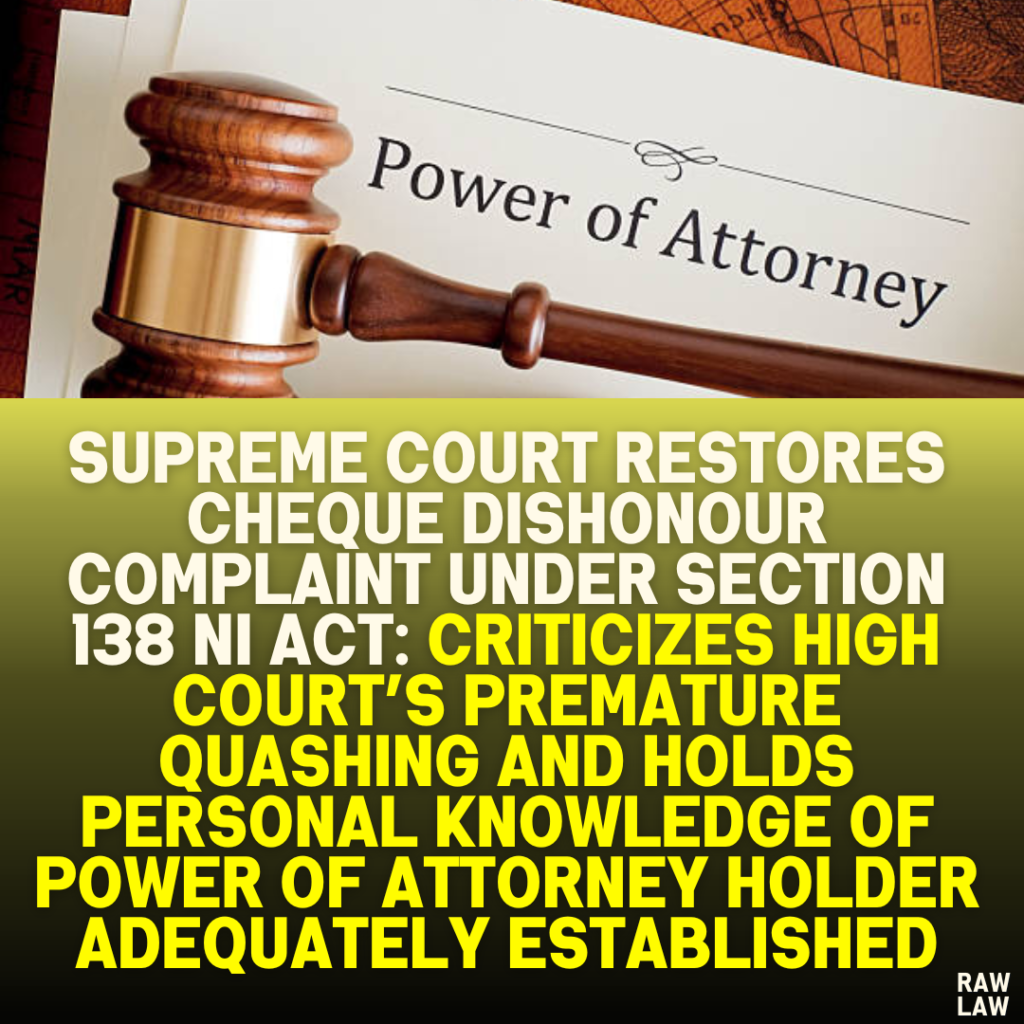Court’s Decision:
The Supreme Court allowed the appeal, set aside the High Court’s judgment quashing the summoning order in the cheque dishonour case under Section 138 of the Negotiable Instruments Act (NI Act), and restored the complaint to the trial court for adjudication on merits. The Court observed that the High Court had incorrectly interpreted the facts and law, resulting in an unwarranted dismissal of the complaint.
Facts:
- Transaction Background:
- M/s Naresh Potteries supplied goods worth ₹1.7 crore to M/s Aarti Industries between June 18, 2021, and July 2, 2021.
- A cheque for ₹1.7 crore was issued by M/s Aarti Industries as payment, but it was dishonoured upon deposit with the reason “exceeds arrangement.”
- Legal Proceedings Initiated:
- A legal notice was served on M/s Aarti Industries demanding payment under Section 138 of the NI Act.
- When the payment was not made, M/s Naresh Potteries filed a criminal complaint before the trial court.
- Representation by Power of Attorney Holder:
- The complaint was filed by Neeraj Kumar, the manager of M/s Naresh Potteries, who was authorised through a letter of authority from the proprietor.
- Neeraj Kumar asserted personal knowledge of the transaction and submitted affidavits in support of the complaint.
- High Court’s Ruling:
- The High Court quashed the complaint, holding that Neeraj Kumar lacked specific and explicit averments about personal knowledge of the transaction in the supporting documents.
Issues:
- Did the power of attorney holder, Neeraj Kumar, possess the requisite personal knowledge of the transaction to maintain the complaint under Section 138 of the NI Act?
- Was the High Court justified in quashing the summoning order at a preliminary stage?
Petitioner’s Arguments:
- Authority and Knowledge:
- The appellant contended that Neeraj Kumar, as manager, was intimately involved in the firm’s day-to-day operations and had detailed personal knowledge of the transaction.
- Submitted affidavits and a letter of authority demonstrating Neeraj Kumar’s competence to represent the firm in legal proceedings.
- Judicial Precedents:
- Relied on judgments such as Shankar Finance, A.C. Narayanan, and TRL Krosaki, which established that authorised representatives with knowledge could validly file complaints under Section 138 of the NI Act.
Respondent’s Arguments:
- Deficiency in Complaint:
- The respondent argued that the complaint and supporting documents lacked explicit assertions about Neeraj Kumar’s personal knowledge of the transaction.
- Contended that the High Court correctly applied the principles laid down in A.C. Narayanan to quash the complaint.
- Procedural Flaws:
- Asserted that the absence of explicit averments rendered the complaint defective, warranting dismissal.
Analysis of the Law:
- Requirements under Section 138 NI Act:
- Section 138 penalises cheque dishonour if a complaint is filed by the payee or holder in due course of the cheque.
- Section 142 requires the complaint to be made in writing by the payee or holder, either directly or through an authorised representative with knowledge of the transaction.
- Judicial Precedents:
- A.C. Narayanan: Highlighted the need for explicit assertions regarding the knowledge of the power of attorney holder.
- TRL Krosaki: Clarified that averments must be read contextually, and circumstantial evidence, including affidavits, could suffice to establish authority and knowledge.
- National Small Industries Corporation: Established that a company or firm could be represented by an authorised employee or agent, provided they demonstrated knowledge and authority.
- High Court’s Error:
- The High Court failed to consider the cumulative effect of the affidavits, authority letter, and complaint, which sufficiently demonstrated Neeraj Kumar’s knowledge and authority.
Precedent Analysis:
- Shankar Finance: Allowed complaints by authorised representatives if they were competent and knowledgeable.
- TRL Krosaki: Held that procedural errors or drafting inadequacies should not defeat substantive justice.
- Samrat Shipping: Stated that issues of authority and knowledge should be addressed during the trial, not at the threshold.
Court’s Reasoning:
- Sufficient Evidence of Knowledge:
- The Supreme Court held that the letter of authority and affidavits clearly indicated Neeraj Kumar’s personal knowledge of the transaction and authorised him to act on behalf of the appellant firm.
- Noted that the trial court could further verify these issues during cross-examination if necessary.
- Premature Quashing:
- The Court emphasised that procedural lapses, if any, should not justify quashing at the initial stage, as the trial process provides adequate safeguards for verifying facts.
- Error in High Court’s Approach:
- The High Court relied narrowly on A.C. Narayanan without considering the broader principles laid down in TRL Krosaki and other precedents.
Conclusion:
- The appeal was allowed.
- The High Court’s judgment was set aside.
- The complaint was restored to the trial court to proceed on merits.
Implications:
- Reinforces that procedural inadequacies should not override substantive justice.
- Clarifies the evidentiary requirements for power of attorney holders representing firms in cheque dishonour cases.
- Limits the scope of High Court intervention at the preliminary stages, ensuring trial courts retain jurisdiction to assess disputes comprehensively.
